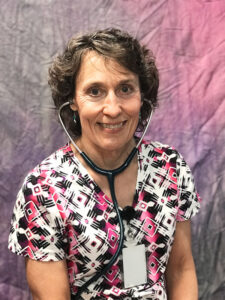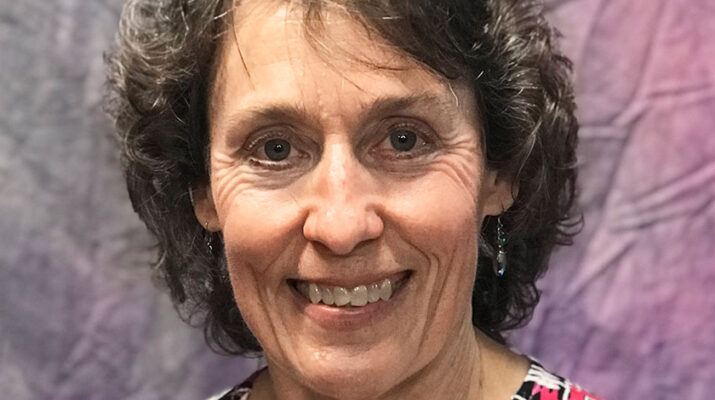Nursing turned out to be the best career decision I ever made, nearly 40 years after graduating from college
Former editor-in-chief of the Syracuse New Times discusses transitioning from journalism to nursing
By Molly English-Bowers

It wasn’t easy, deciding what to do with the rest of my working life when I was ‘let go’ from an occupation I studied for, excelled at, and enjoyed for 25 years.
Not only was my ego wounded (not to mention the humiliation of being fired), but it was daunting figuring out, at 51, what to do when retirement is at least 14 years away.
Within weeks of losing my job as editor-in-chief of the Syracuse New Times, I landed a job as communications director at a public employee union. But, like the newspaper industry, labor unions have been contracting for decades and there simply wasn’t enough work for me. After 18 months I was laid off.
I continued freelance writing, created my own website, began training at Prudential Financial, trying to find a new direction.
I applied for unemployment, which helped close the budget gap, but the entire process brought with it a set of, frankly, silly workshops.
I didn’t need help writing an effective resume; I had interviewed and hired dozens of staff and interns. I didn’t need help with interview skills (as a journalist I had interviewed Graham Nash, Hillary Clinton, Jim Boeheim and so many more).
I needed help rallying my self-confidence, looking at continuing education options and figuring out how to pay for it.
Once I had decided upon applying to OCM BOCES’ licensed practical nursing program, CNY Works, which facilitates the state unemployment insurance program from its offices on James Street in Syracuse, was extremely helpful. An adviser at CNY Works told me about a grant from the federal Workforce Innovation and Opportunity Act to help pay the bill. I drafted a letter requesting the grant. Meanwhile, I applied to the LPN program, writing a letter of intent, taking the appropriate entrance exams and being interviewed by staff at BOCES.
Within weeks I received an acceptance letter from BOCES as well as a letter from CNY Works informing me that I had been awarded a $5,000 grant. The cost for pursuing this second career was approximately $12,000 for a 12-month program. That included books, supplies to learn clinical skills and instruction from experienced nurses.
Even if I hadn’t gotten that grant, it seems to me that $1,000 a month is not a lot of money to spend depending upon where you wind up working; you can recoup that money pretty quickly.
Classes began on April 11, 2015, my 54th birthday.
I continued to receive unemployment benefits, which allowed me to study full time. I remain in awe of my classmates who worked full time, tended to their children and attended class from 4 to 10:30 p.m. Their struggle was real, but most made it through the program and work as nurses today.
Graduation day was March 30, 2016; I was chosen to be class speaker, I was named valedictorian, and I earned the excellence in clinical award. Not a bad start to a second career. All that remained was to take and pass the NCLEX (National Council Licensure Examination), and then secure employment.
One of the beauties of choosing a career in nursing is the impressive range of places to work. I knew where I didn’t want to work, a hospital. My first job was at a local family practice as a graduate nurse, meaning that you earn valuable experience, as well as a salary, before you take the exam. Working at a hectic practice that serves all ages and all conditions proved overwhelming for me and I moved on.
Next stop was enhanced assisted living, for those who need help with personal care and medication administration but who do not have dementia or Alzheimer’s as a diagnosis. These facilities cannot admit residents that need 24-hour care. Again, this was not an ideal fit.
So, I applied to Syracuse Home in Baldwinsville on a per-diem basis, not wanting to commit to a full-time position there until I was certain it was the place for me. It didn’t take long for me to realize I had found a work home. I informed the director of nursing that I was interested in full-time employment and within a few months, a position opened up.
And what a wonderful decision it has been.
The job is challenging but not overwhelming. I learn something nearly every day. It’s easy to fall in love with the residents, most of whom have dementia as a diagnosis.
Syracuse Home also has a rehab unit, admitting patients recovering from any variety of surgeries. The goal is to rehabilitate them so they can return home. I work as a float nurse, meaning I am assigned to any of the three units and working on unit 3 (rehabilitation) provided a mental break from the challenges on the long-term units.
As an aside, I did begin pursuing an RN, taking prerequisites at Onondaga Community College. As much as I enjoy sitting in a classroom and as well as I did academically, I didn’t want to pause my working life again, this time to become an RN. Sure, it’s the next step on the nursing career (and salary) ladder, but I am content where I am. I don’t need to be an RN to feel any more valuable to my co-workers and to the facility.
Most importantly, Syracuse Home management and staff value my contributions, my work ethic, and my love of the residents. I have found a happy ending to my professional life.
Now, at age 60, I can keep working as long as I want to, in whatever capacity my license allows, wherever I may be living and as little or as much as I choose.
My biggest regret? I didn’t become a nurse 38 years ago.
Career opportunities
First and foremost, nurses must enjoy caring for people. Sure, the profession is growing and job opportunities abound. But, if you aren’t compassionate, the challenges can be overwhelming. Being a nurse is stressful enough and if you hate what you do, trust me, it will show.
Top reasons for choosing nursing as my second career:
• The options: LPNs can work in doctor offices, hospitals, assisted living and long-term care facilities (commonly known as nursing homes), public schools and colleges, as traveling nurses or in-home.
The license is, for the most part, portable. Reciprocity exists with most every other state, according to practicalnursing.org.
Nurses can work full time, part-time, or per diem (choosing your days and shifts). Furthermore, most facilities offer differentials over the day shift base pay for working evening and night shifts. I work evenings for several reasons and the extra pay per hour is just one.
• Demand: A growing emphasis on preventive care, rising rates of chronic conditions and an aging population add up to an increased need for LPNs and RNs. In 2018, there were more than four million jobs in five nurse occupations, according to the U.S. Bureau of Labor Statistics. Employment growth isn’t the only source of job openings, either. Most of the openings for nurses are expected to result from the need to replace those who leave the occupation permanently. Moreover, employment of nurses is projected to grow much faster than all other occupations through 2028.
And, it appears, I am not alone. According to the National Sample Survey of Registered Nurses, 45% of RNs are 50 years or older. And, according to the same survey, the average age of all licensed registered nurses is currently 47 and this average is increasing every year, indicating that more and more students are entering the field after having pursued another career.
Different nurses, different roles
Nurses have a special role in providing healthcare to patients. The job descriptions vary but the goal remains the same: to give the best care possible.
Here are the general tasks for each specific license, although tasks can vary depending on worksite:
• Licensed practical and licensed vocational nurses give patients basic care and monitor and record their health, such as by checking their vital signs. They may be supervised by a registered nurse.
• Registered nurses evaluate patients’ health, provide and coordinate patient care and educate patients about health conditions.
• Nurse anesthetists administer anesthesia and any related care before, during and after medical procedures.
• Nurse midwives assist in labor and delivery and provide gynecological exams, family planning services and prenatal care to women.
• Nurse practitioners work as primary and specialty care providers. They may make diagnoses, order medical tests, and prescribe medications.

